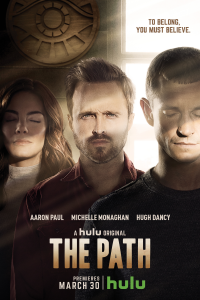Is Hulu’s New Series The Path One You Want to Follow?

With the number of religiously unaffiliated increasing in the United States, it’s about time a television series addressed what it means to lose faith. Premiering on Hulu last Wednesday, the new drama The Path studies the effect of religion and skepticism within the realm of human relationships. With familiar names like Aaron Paul (Breaking Bad), Hugh Dancy (Hannibal), and Michelle Monaghan (True Detective), The Path is certainly set up for success—but does it hit the mark?
The show features Meyerism, a Scientology-like movement operated out of a compound in upstate New York that oversees the lives of its followers. As with almost all religions, its rules inform their daily lives. A large eye, the symbol of Meyerism, symbolically watches every aspect of its followers’ lives as over-exaggerated wall hangings in home spaces. The protagonist, Eddie (Paul), begins to question his religion after attending a retreat in Peru. What ensues is a story of a family on the verge of collapse, their lives deeply intertwined with their religion.
The writer Jessica Goldberg (known for producing Parenthood) told The Hollywood Reporter that the show is an attempt to reconcile the death of her father and the loss of a marriage with her own “spiritual crisis.” She decided to “write about what it feels like to suddenly wake up and doubt everything you believed in. Write about what it means to lose faith.” However, losing faith isn’t the only focus of the show. Executive producer Jason Katims told Refinery29 that The Path “in one way was about this cult, but to me, it was really about a family entering into this very scary and challenging moment.”
Although the audience members may or may not have ever left a cult, humanists may be able to relate to Eddie’s stages of doubt. He types “is Meyerism real?” into an online search engine and even contemplates staying with Meyerism solely to keep his family together. Ultimately, Eddie feels forced to confess cheating on his wife (reprehensible in Meyerism), because his actual offense is perceived as being far worse and would result in his excommunication. “He would rather confess to something he absolutely had nothing to do with than to admit the truth, because if he does, he’s going to lose everyone he loves,” Paul discussed in Variety.
Meyerism seems to be its own fluid character. It strongly influences the decisions of its followers—weaving its way through their minds and relationships. Sarah (Monaghan), Eddie’s wife, is the only character that follows “the path” in its pure form. Unlike her husband, who struggles to reconcile his skepticism with the survival of his family, she unapologetically guards her faith even if it means the dissolution of her family. The complexity of the relationships in The Path is its strong point and may be enough of a reason to stick with it. More often than not, Meyerism is the chief underlying antagonist, but ultimately the individuals must determine the validity and importance of Meyerism, not the religion itself.
It may be too early to determine, but while the story provides a fresh viewpoint of religion, it is still has its weaknesses. Gaps in writing are well-accommodated by a strong cast. The story yearns to explore the complexity of human relationships—and sometimes it gets there. If you’re fascinated by relationships, religion, and the strength of our bonds, you might be interested in giving The Path a shot.
